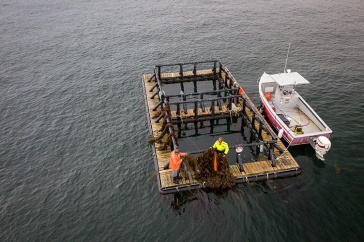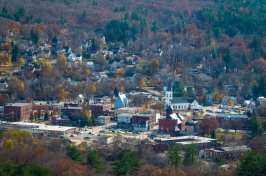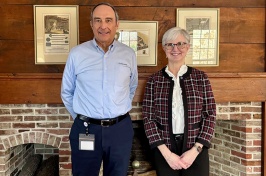UNH Receives Millions in Donations, Including $5M to Expand Its Commitment to Sustainable Seafood

Pictured is one of the University of New Hampshire’s aquaculture sites just off of New Castle at the mouth of the Piscataqua River. Photo courtesy of UNH.
DURHAM, N.H.—Thanks to a $5 million gift, the University of New Hampshire will transform and expand its existing open ocean aquaculture site into the UNH Sustainable Seafood Field Laboratory. This first-of-its-kind field lab will provide the critical data needed to monitor local environment conditions and the aquaculture system’s impact on natural fisheries.
The gift, made through the Emily Landecker Foundation, was inspired by UNH’s proven excellence in marine sciences. “UNH is uniquely positioned to develop one of the nation’s top sustainable seafood systems programs with its tremendous research and academic strengths in oceanography, ocean engineering and marine biology. Marine bioresources have the promise to play a key role in food production worldwide and we feel fortunate to be able to help the university begin this endeavor by funding a sustainable seafood lab,” said foundation representatives.
“We are incredibly grateful for the ongoing and generous support of the Emily Landecker Foundation,” said Diane Foster, director of the School of Marine Science and Ocean Engineering. “There is an urgent need for sustainable seafood systems that can help feed communities around the world as they adapt to our changing climate. This gift will allow us to advance research involving the interplay of natural and farmed seafood systems and identify solutions for low environmental impact aquaculture systems.”
In addition to this support for the marine sciences, the university received a number of significant gifts in the last fiscal year:
- Paul Anderson ’63G donated an additional $3 million to the chemistry department, increasing his original bequest of $7 million.
- UNH Foundation Board emeritus member David Greenlaw ’80 made a gift of $2.5 million to fully endow the Dwayne Wrightsman Professor of Finance, a position he first established in 2005 to further develop scholarship in the fields of macroeconomics and finance.
- Paul and Anna Grace Holloway donated $1.6 million to endow their Holloway Prize Competition. Established in 1988, the competition recognizes students who conceptualize, develop and pitch the most compelling proposals to bring a product to market and awards students approximately $100,000 in cash and prizes every year.
- Granite State Development Corp., founded by Alan Abraham and now led by Scott Gardiner ’88G, committed $1 million to provide 10 in-state students with annual scholarship support. GSDC is a nonprofit that aims to create economic development by assisting businesses in acquiring small business loans through the 504 lending program.
- An alumna of the class of 1973 committed $1 million in support of need-based scholarships for New Hampshire students.
- Additional anonymous donations include $1 million from an emeritus faculty member in support of a future art museum or fine arts scholarships, $4.6 million for scholarships and $1.5 million in support of the College of Engineering and Physical Sciences.
“At a time when their support has tremendous meaning for our community, our donors have demonstrated their enduring commitment to UNH by investing in areas that strengthen our mission,” said Debbie Dutton, vice president for advancement and president of the UNH Foundation. “Their generosity is heartfelt and inspiring.”
The University of New Hampshire inspires innovation and transforms lives in our state, nation, and world. More than 16,000 students from all 50 states and 71 countries engage with an award-winning faculty in top-ranked programs in business, engineering, law, health and human services, liberal arts and the sciences across more than 200 programs of study. As one of the nation’s highest-performing research universities, UNH partners with NASA, NOAA, NSF and NIH, and receives more than $110 million in competitive external funding every year to further explore and define the frontiers of land, sea and space.
PHOTO FOR DOWNLOAD:
https://unh.edu/sites/default/files/departments/open_ocean_aquaculture.jpg
Caption: Pictured is one of the University of New Hampshire’s aquaculture sites just off of New Castle at the mouth of the Piscataqua River. Photo courtesy of UNH.
Latest News
-
Research Finds Rural Americans Carry Heavy Burden Accessing Social Security Benefits and InformationMarch 27, 2025
-
March 25, 2025
-
March 17, 2025
-
March 12, 2025
-
February 19, 2025














































